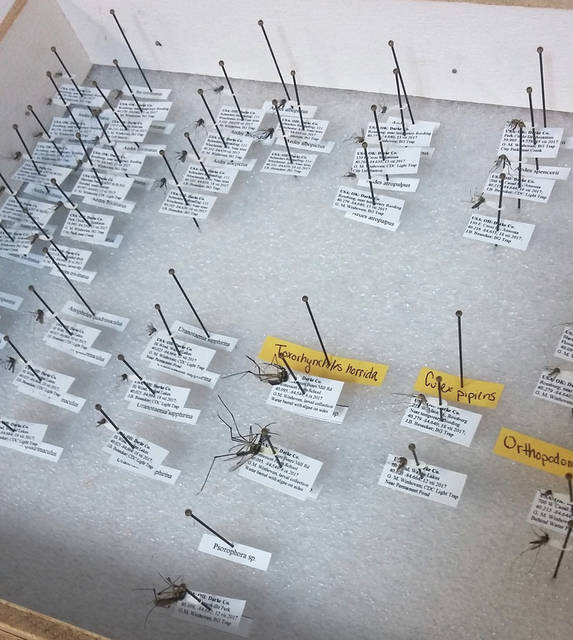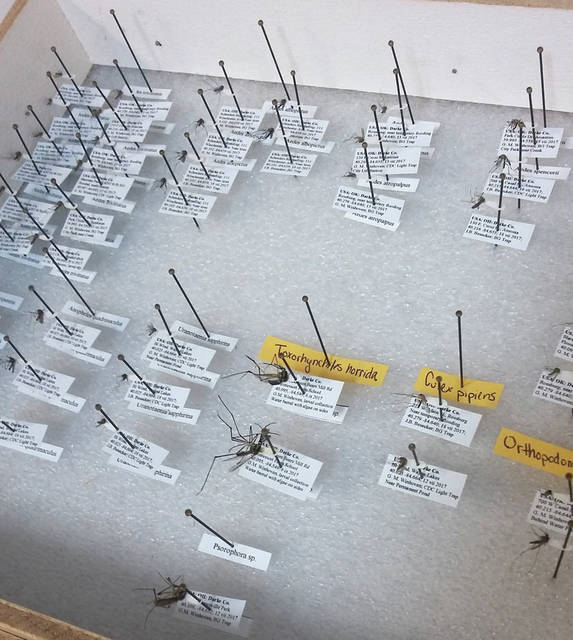

DARKE COUNTY – The Darke County Health Department has detected over a thousand mosquitoes from 20 different species in the county, but none that carry the potentially deadly West Nile virus.
According to Grace Winhoven, a Darke County native who studied mosquitoes as disease vectors at Cornell University, the Health Department, along with numerous other entities throughout Ohio, has started a Mosquito Surveillance and Control Program. Winhoven spoke to a group of citizens at the Shawnee Prarie Nature Preserve Thursday night.
The purpose of the program, Winhoven said, is to determine which species of mosquito can be found in Darke County, in what areas, and during what times of year; map the areas where mosquitoes seem to be breeding in order to determine what public spaces in the county the Health Department needs to protect; and, of course, to screen the insects for West Nile.
“For instance, this summer we had the drawings going on in Ansonia,” Winhoven said, referring to the Queen of Hearts promotion at Whistle Stop Bar and Grill. “When we know we’ve got a lot of people standing around outside at night, for several weeks in a row, we know that’s an area we need to be concerned about.”
Mosquitoes spread disease by biting an infected person or animal, contracting the infection themselves, and then passing it along in their saliva to the next person they bite. West Nile Virus, which is spread by a specific species of mosquito found in Darke County, famously broke out in New York City in 1999, killing seven people.
West Nile generally presents as a mild case of the flu, though as many as 80 percent of those infected show no symptoms at all. About one in every 150 people infected will experience more severe complications, such as swelling of brain and spinal tissue.
According to the Centers for Disease Control, over 900 cases of West Nile were reported in Ohio between 1999 and 2015, while media sources indicate that at least four cases were identified throughout Ohio in August of this year.
Mosquitoes lay their eggs in small pools of standing water, as opposed to ponds or streams full of fish, tadpoles, and other predators. The plastic lid of a McDonald’s cup left outside in the rain is spacious enough to breed mosquitoes, according to Winhoven, while a birdbath can breed as many as a thousand mosquito larvae over the course of a summer.
The Health Department has set traps in communities like Greenville, Gettysburg, Bradford, and Arcanum to assist with catching and cataloguing the insects. The traps are checked about twice a week, and come in three different varieties.
“The BG traps smell like someone who hasn’t showered in about a week,” Winhoven said, referring to the first variety, which lure mosquitoes by emitting substances usually found on human skin.
Light traps, meanwhile, use a combination of light and CO2 emissions to attract the bugs. Gravid traps, finally, use rancid water to encourage mosquitoes to lay their eggs.
“We put a bunch of grass and straw and rabbit pellets in there and let it stand in the sun for like a week,” Winhoven said about the traps.
Winhoven offered a number of methods for people to protect themselves from the bugs, including reducing exposed skin, which emits CO2 that attracts mosquitoes; using insect repellent containing a chemical called deet, which confuses their senses and makes it difficult for them to seek out human prey; and draining any sources of standing water, which tend to prevalent in places where human beings hang around.
“This is why mosquitoes are so dangerous,” Winhoven said. “Because they tend to live where we live. We’re the ones who create the perfect habitats for them.”





